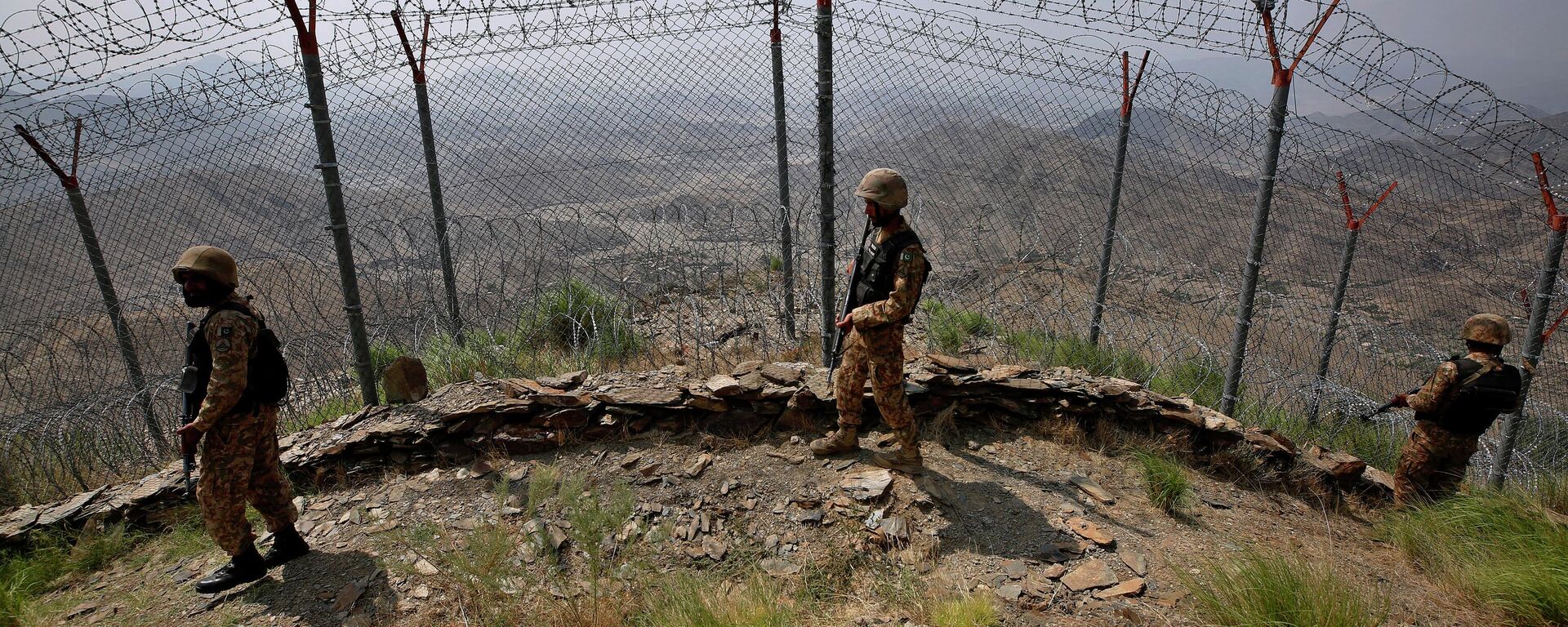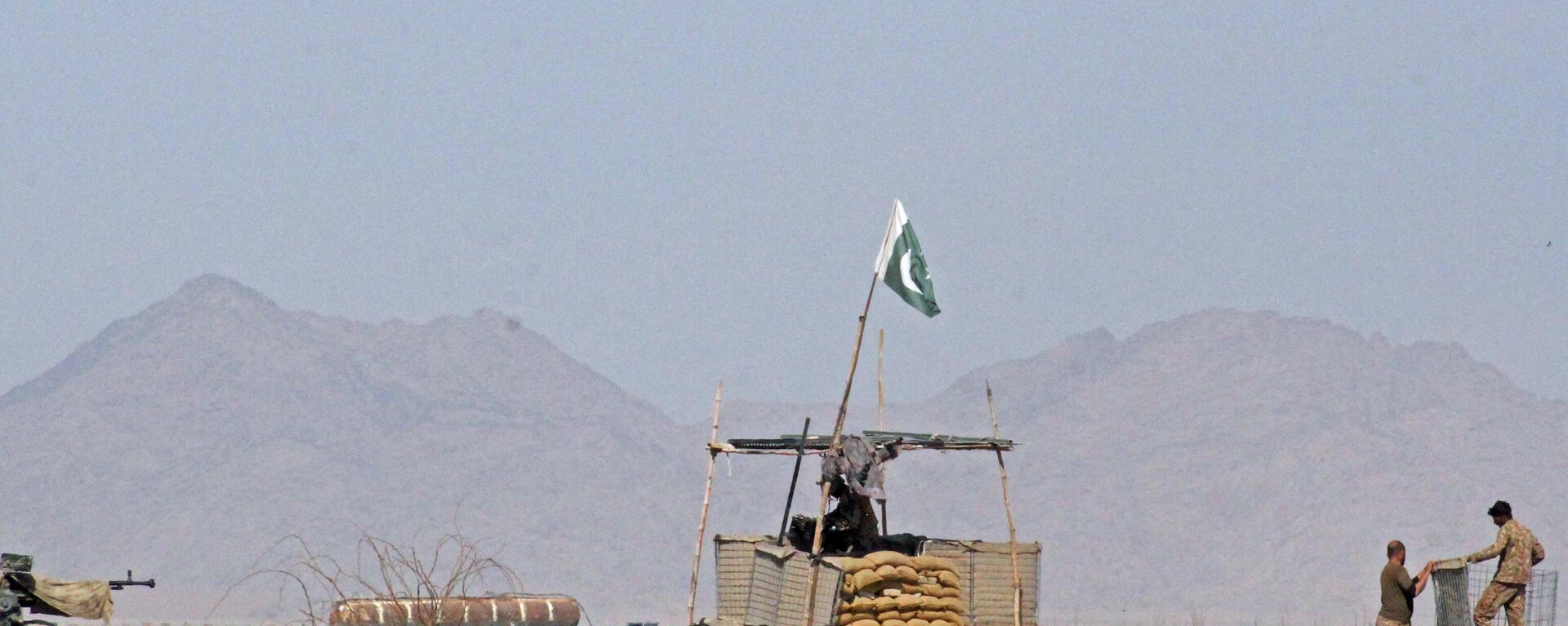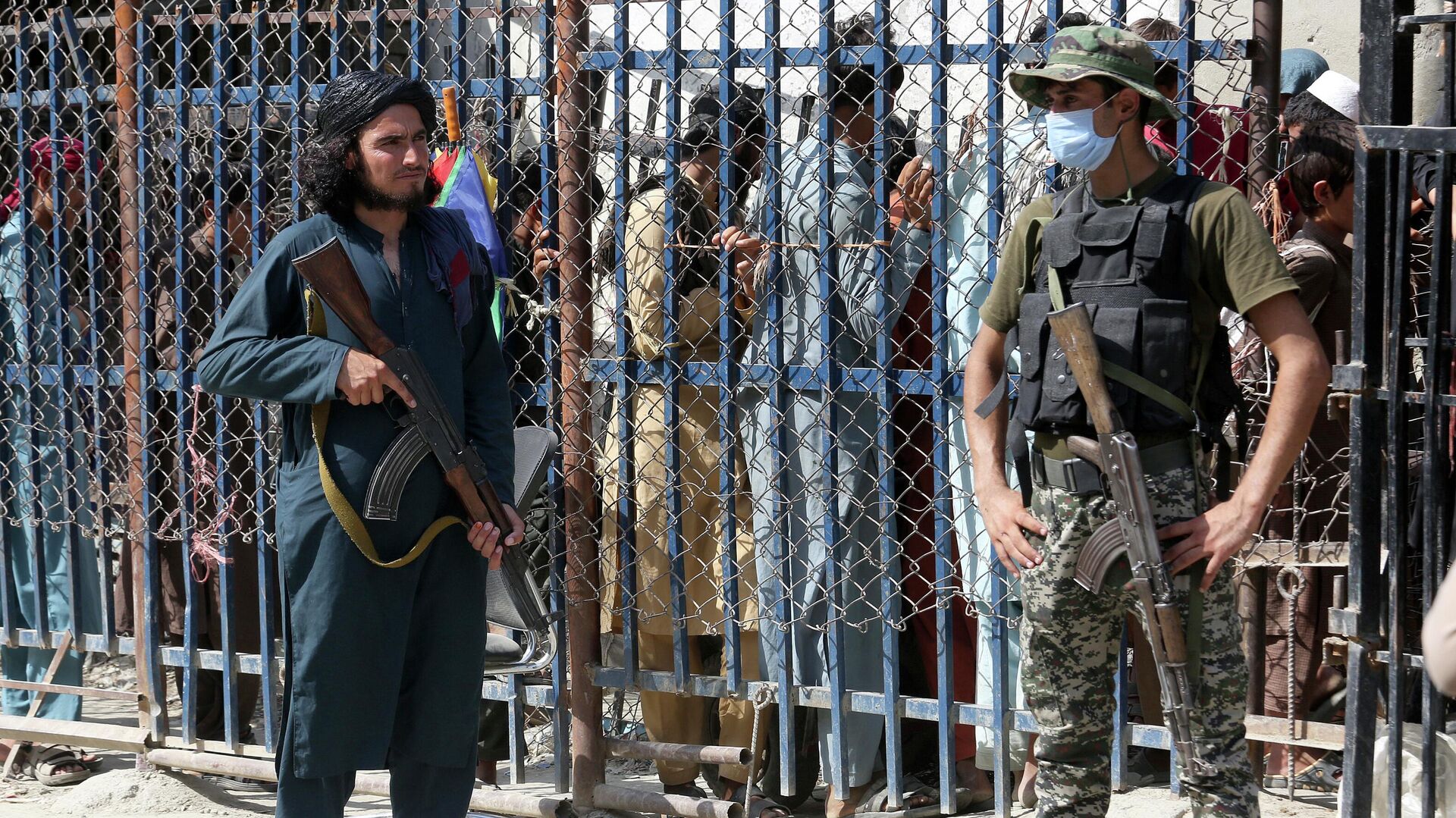https://sputnikglobe.com/20221202/pakistans-terror-ordeal-not-over-as-major-militant-group-ditches-ceasefire-1104939277.html
Pakistan's Terror Ordeal Not Over as Major Militant Group Ditches Ceasefire
Pakistan's Terror Ordeal Not Over as Major Militant Group Ditches Ceasefire
Sputnik International
In a menacing statement on Monday, the group ordered its fighters to carry out attacks across Pakistan “wherever and whenever”. For a nation familiar with... 02.12.2022, Sputnik International
2022-12-02T11:16+0000
2022-12-02T11:16+0000
2022-12-08T18:03+0000
world
ttp
terrorism
armed groups
attacks
afghanistan
security
ceasefire
pakistani armed forces
pakistan
https://cdn1.img.sputnikglobe.com/img/07e6/09/0e/1100754680_0:89:3158:1865_1920x0_80_0_0_a8ca8eaff8cca24840be50839ef2402d.jpg
The ill-fated peace process between Pakistan's government and the Tehrik-i-Taliban Pakistan (TTP)* armed group has come to an end as the group called off its ceasefire and ordered its fighters to conduct attacks across the country.The ceasefire was agreed upon in June, however, the TTP claims that Pakistan's government continued to carry out surgical strikes against the armed group, allegedly provoking the TTP to carry out a suicide bombing in Quetta on Wednesday in which four people were killed and 30 more injured.Who Are They?TTP is an umbrella organization of various Islamist armed militant groups operating along the Afghan–Pakistani border. It was formed in 2007 by Baitullah Mehsud and current leader Noor Wali Mehsud.Throughout the 2000s and 2010s, the TTP carried out suicide bombings across the country. It attacked schools, bazaars, mosques, churches, festivals and parks. The group is listed as a terrorist organization by the United Nations.Pakistan's Armed Forces came down hard on the TTP and launched military operations to drive them out of the country into neighboring Afghanistan. Many Pakistani soldiers and officers lost their lives in the process, but the army managed to bring terrorism under control and TTP leaders either went into hiding or migrated to Afghanistan. The northern areas of Pakistan that were once a haven for the armed group were now free and started attracting local and foreign travelers.However, since the US failure in Afghanistan last year, with the sudden withdrawal of its troops and the Afghan Taliban** returning to power in Kabul, the TTP has once again become active in Pakistan, emboldened by the resurrection of its sister organization.The word Taliban comes from "tālib", which means "student" in Arabic. Back when the group was formed, it was composed mostly of peasant farmers of Afghan and Pashtoun origins. They often got together in madrasas, or so-called “religious” schools, where they were trained by their leaders to fight the "infidels".The Taliban consolidated their strength in southern Afghanistan, whereas the TTP resided mostly in Lakki Marwat district of Pakistan’s northwestern province of Khyber Pakhtunkhwa.Post 9/11, when the US and NATO troops invaded Afghanistan, millions of Afghan refugees sought shelter in Pakistan. The war in Afghanistan resulted in serious consequences for Islamabad as terrorism spilt across the border, becoming one of Pakistan’s foremost problems.Tehrik-i-Taliban Pakistan opposed Islamabad's support for the US during the war in Afghanistan and for more than a decade the armed group waged a rebellion in the country.The TTP had multiple demands, some of which included the imposition of hardline Islamic law within the country, the release of its key members arrested by the government and a reversal of the merger of Pakistan’s tribal areas with Khyber Pakhtunkhwa province.Connecting the DotsSwat District is a district in the Malakand division of Khyber Pakhtunkhwa, Pakistan. It has a population of some 2.5 million inhabitants making Swat the 15th-largest district of Khyber Pakhtunkhwa province.Swat valley is locally known as Pakistan’s Switzerland thanks to its snow-capped mountains and scenic views. Its natural wonders include breathtaking diverse landscapes, natural wildlife, lush forests and crystal clear rivers. It also has a dark side - not so long ago it was ruled by the TTP.From 2007 to 2010, it was the poster image for the TTP rule of terror. The group, seeking to implement a fanatic form of Shariah law, campaigned against girls’ education. Some 640 schools were destroyed in this period in Swat and its adjoining districts, according to the Education Department.Swat valley is also home to Nobel laureate Malala Yousafzai, a girl who ten years ago survived a bullet in the head by militants. In 2012, Yousafzai, who was 15 at the time, was shot in a school bus for speaking out earlier for girl’s education. She survived miraculously, and her attack sparked outrage both in Pakistan and internationally.Thanks to Pakistan's army and its full-scale military operation against the TTP from 2009 to 2018, Swat valley was cleared of militants and thousands of girls like Yousafzai could finally go to school in peace.Unfortunately, it seems that the good times in the region were not meant to last. For the past few months, thousands of Swatis have been raising alarm and protesting against a growing number of violent incidents in their hometown.Activists have been saying that there had been a clear increase in violent incidents in the region, including kidnappings, extortion and killings. The locals are quite familiar with what this could mean and they are demanding that the government control the terrorist elements who are allegedly back and spreading terror.According to data compiled by the Pakistan Institute for Peace Studies, an Islamabad-based research organization, the country has witnessed an unbelievable 51% increase in the number of terrorist attacks in a single year, since the Taliban came to power in Afghanistan in August last year.Wake-up Call Mohsin Dawar, a member of Pakistan’s National Assembly, condemned the latest attack carried out by the TTP on Wednesday and said that this should be a cause for concern.Similarly, a civil rights group, The Human Rights Commission of Pakistan, also issued a statement last month, saying that residents of Swat are justified in holding security forces responsible.Hence, it is clear that despite the ceasefire, the TTP continued its attacks this year, claiming that they were defensive in nature and only acted in retaliation for the strikes carried out by Pakistan’s military.*banned in Russia** under UN sanctions over terrorist activitiesThe views and opinions expressed in this column are those of the author and do not necessarily reflect the position of Sputnik.
https://sputnikglobe.com/20220927/taliban-warns-of-war-with-pakistan-amid-accusations-of-sheltering-terrorists-1101277103.html
https://sputnikglobe.com/20221121/pakistan-reopens-key-border-crossing-days-after-taliban-clash-1104481486.html
https://sputnikglobe.com/20211109/nobel-prize-winner-girls-rights-activist-malala-ties-knot-in-private-ceremony-in-england-1090604834.html
afghanistan
pakistan
Sputnik International
feedback@sputniknews.com
+74956456601
MIA „Rossiya Segodnya“
2022
Aneela Rashid
https://cdn1.img.sputnikglobe.com/img/07e6/09/0e/1100768477_0:338:606:944_100x100_80_0_0_af078d1bbaf1e33c21f16169e9ed7a5f.jpg
Aneela Rashid
https://cdn1.img.sputnikglobe.com/img/07e6/09/0e/1100768477_0:338:606:944_100x100_80_0_0_af078d1bbaf1e33c21f16169e9ed7a5f.jpg
News
en_EN
Sputnik International
feedback@sputniknews.com
+74956456601
MIA „Rossiya Segodnya“
Sputnik International
feedback@sputniknews.com
+74956456601
MIA „Rossiya Segodnya“
Aneela Rashid
https://cdn1.img.sputnikglobe.com/img/07e6/09/0e/1100768477_0:338:606:944_100x100_80_0_0_af078d1bbaf1e33c21f16169e9ed7a5f.jpg
who are ttp< suicide bombing in quetta, pakistan terror attacks
who are ttp< suicide bombing in quetta, pakistan terror attacks
Pakistan's Terror Ordeal Not Over as Major Militant Group Ditches Ceasefire
11:16 GMT 02.12.2022 (Updated: 18:03 GMT 08.12.2022) In a menacing statement on Monday, the group ordered its fighters to carry out attacks across Pakistan “wherever and whenever”. For a nation familiar with religious extremism and the terror it can cause, this development is a matter of grave concern.
The ill-fated peace process between Pakistan's government and the Tehrik-i-Taliban Pakistan (TTP)* armed group has come to an end as the group called off its ceasefire and ordered its fighters to conduct attacks across the country.
The ceasefire was agreed upon in June, however, the TTP claims that Pakistan's government continued to carry out surgical strikes against the armed group, allegedly provoking the TTP to carry out a
suicide bombing in Quetta on Wednesday in which four people were killed and 30 more injured.
TTP is an umbrella organization of various Islamist armed militant groups operating along the Afghan–Pakistani border. It was formed in 2007 by Baitullah Mehsud and current leader Noor Wali Mehsud.
Throughout the 2000s and 2010s, the TTP carried out suicide bombings across the country. It attacked schools, bazaars, mosques, churches, festivals and parks. The group is listed as a terrorist organization by the United Nations.
Pakistan's Armed Forces came down hard on the TTP and launched military operations to drive them out of the country into neighboring Afghanistan. Many Pakistani soldiers and officers lost their lives in the process, but the army managed to bring terrorism under control and TTP leaders either went into hiding or migrated to Afghanistan. The northern areas of Pakistan that were once a haven for the armed group were now free and started attracting local and foreign travelers.
However, since the US failure in Afghanistan last year, with the sudden withdrawal of its troops and the Afghan Taliban** returning to power in Kabul, the TTP has once again become active in Pakistan, emboldened by the resurrection of its sister organization.

27 September 2022, 16:05 GMT
The word Taliban comes from "tālib", which means "student" in Arabic. Back when the group was formed, it was composed mostly of peasant farmers of Afghan and Pashtoun origins. They often got together in madrasas, or so-called “religious” schools, where they were trained by their leaders to fight the "infidels".
The Taliban consolidated their strength in southern Afghanistan, whereas the TTP resided mostly in Lakki Marwat district of Pakistan’s northwestern province of Khyber Pakhtunkhwa.
Post 9/11, when the US and NATO troops invaded Afghanistan, millions of Afghan refugees sought shelter in Pakistan. The war in Afghanistan resulted in serious consequences for Islamabad as terrorism spilt across the border, becoming one of Pakistan’s foremost problems.
Tehrik-i-Taliban Pakistan opposed Islamabad's support for the US during the war in Afghanistan and for more than a decade the armed group waged a rebellion in the country.
The TTP had multiple demands, some of which included the imposition of hardline Islamic law within the country, the release of its key members arrested by the government and a reversal of the merger of Pakistan’s tribal areas with Khyber Pakhtunkhwa province.
Swat District is a district in the Malakand division of Khyber Pakhtunkhwa, Pakistan. It has a population of some 2.5 million inhabitants making Swat the 15th-largest district of Khyber Pakhtunkhwa province.

21 November 2022, 09:46 GMT
Swat valley is locally known as Pakistan’s Switzerland thanks to its snow-capped mountains and scenic views. Its natural wonders include breathtaking diverse landscapes, natural wildlife, lush forests and crystal clear rivers. It also has a dark side - not so long ago it was ruled by the TTP.
From 2007 to 2010, it was the poster image for the TTP rule of terror. The group, seeking to implement a fanatic form of Shariah law, campaigned against girls’ education. Some 640 schools were destroyed in this period in Swat and its adjoining districts, according to the Education Department.
Swat valley is also home to Nobel laureate Malala Yousafzai, a girl who ten years ago survived a bullet in the head by militants. In 2012, Yousafzai, who was 15 at the time, was shot in a school bus for speaking out earlier for girl’s education. She survived miraculously, and her attack sparked outrage both in Pakistan and internationally.
Thanks to Pakistan's army and its full-scale military operation against the TTP from 2009 to 2018, Swat valley was cleared of militants and thousands of girls like Yousafzai could finally go to school in peace.

9 November 2021, 21:12 GMT
Unfortunately, it seems that the good times in the region were not meant to last. For the past few months, thousands of Swatis have been raising alarm and protesting against a growing number of violent incidents in their hometown.
Activists have been saying that there had been a clear increase in violent incidents in the region, including kidnappings, extortion and killings. The locals are quite familiar with what this could mean and they are demanding that the government control the terrorist elements who are allegedly back and spreading terror.
According to data compiled by the Pakistan Institute for Peace Studies, an Islamabad-based research organization, the country has witnessed an unbelievable 51% increase in the number of terrorist attacks in a single year, since the Taliban came to power in Afghanistan in August last year.
"As many as 433 people were killed and 719 wounded in 250 terrorist attacks in Pakistan between August 2021 and August 2022," according to the report.
Mohsin Dawar, a member of Pakistan’s National Assembly, condemned the latest attack carried out by the TTP on Wednesday and said that this should be a cause for concern.
"Mainstream Pakistan perhaps does not realize the severity of the situation because they are not feeling the heat yet," he said. "If Pakistan’s political and military leadership does not sit together to resolve this menace, I fear that in the coming days the situation will be out of control," Dawar said.
Similarly, a civil rights group, The Human Rights Commission of Pakistan, also issued a statement last month, saying that residents of Swat are justified in holding security forces responsible.
Hence, it is clear that despite the ceasefire, the TTP continued its attacks this year, claiming that they were defensive in nature and only acted in retaliation for the strikes carried out by Pakistan’s military.
** under UN sanctions over terrorist activities
The views and opinions expressed in this column are those of the author and do not necessarily reflect the position of Sputnik.






